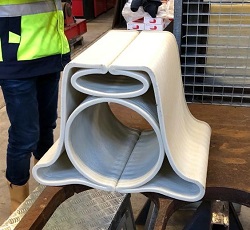SeaBioComp Project develops bio-polymer 3D printed marine fender profile
 The fender profile was printed on an FDM Printer by Poly Products, a Netherlands based composite production and specialist engineering business, and partner in the SeaBioComp project, in collaboration with de Klerk Waterbouw who specialise in the installation of products for the marine environment.
The fender profile was printed on an FDM Printer by Poly Products, a Netherlands based composite production and specialist engineering business, and partner in the SeaBioComp project, in collaboration with de Klerk Waterbouw who specialise in the installation of products for the marine environment.
The SeaBioComp, EU Interreg 2 Seas project, funded research into the adaptations required to enable the 3D printing machine to process biopolymers which was undertaken by Poly Products. Research and testing into temperature control, natural fibre selection and corrosion of extruder parts were all thoroughly reviewed and more information is available on the SeaBioComp website. http://www.seabiocop.eu
Project observer partner, De Klerk Waterbouw wanted to investigate the design and production of a bio-composite vertical fender profile for the berthing and guiding of ships, in order to replace traditionally used tropical hard woods and synthetic plastics. Collaboration with industry, end users, research establishments and public authorities is a key part of the SeaBioComp project, so a number of partners worked on the design, material selection, 3D printing, testing and evaluation of a scaled version of the biopolymer fender profile.
The findings from the material testing led by the University of Portsmouth and mechanical testing by De Klerk Waterbouw show very promising results and further optimization of designs, materials and production may lead to future full-scale production.
Organisations interested in bio-based materials for the marine environment are invited to join the SeaBioComp Interest Group at http://www.seabiocomp.eu/interest_group/
Subscribers will be kept informed of project results and activities, relevant events, workshops and forums. The reports into the adaptations required for 3D printing of biocomposites and details of the 3D printed fender are available as downloads from the website.
http://www.seabiocomp.eu/downloads/


